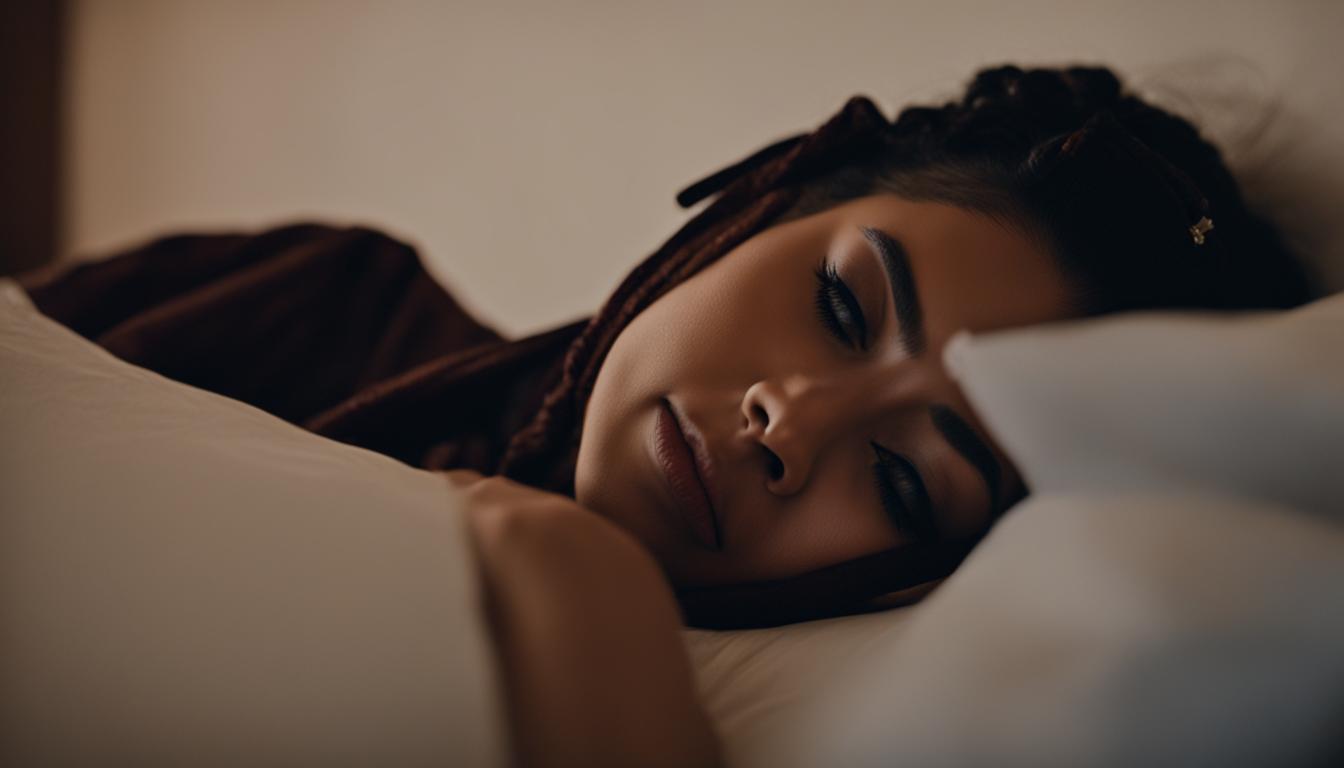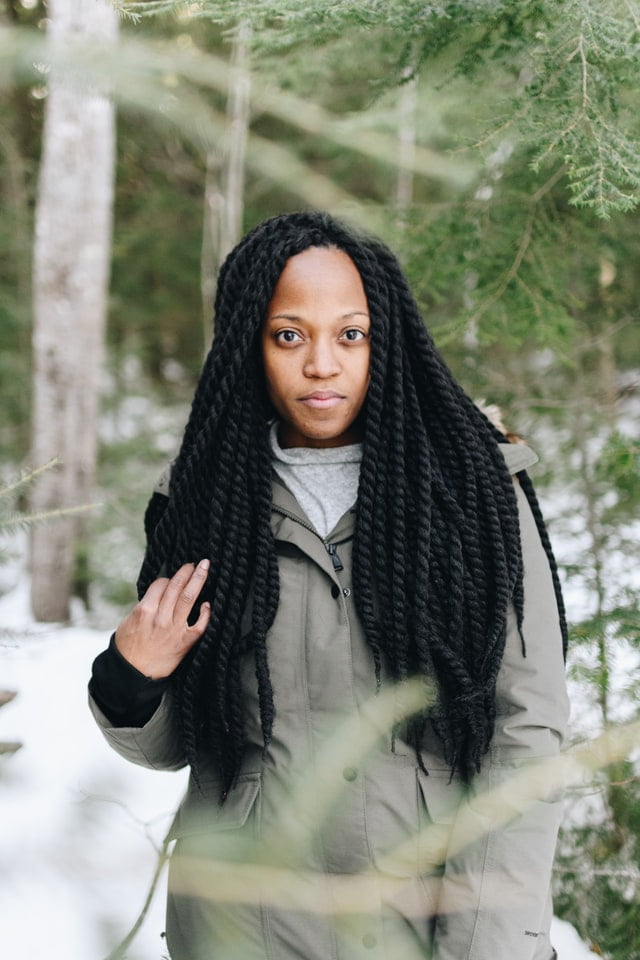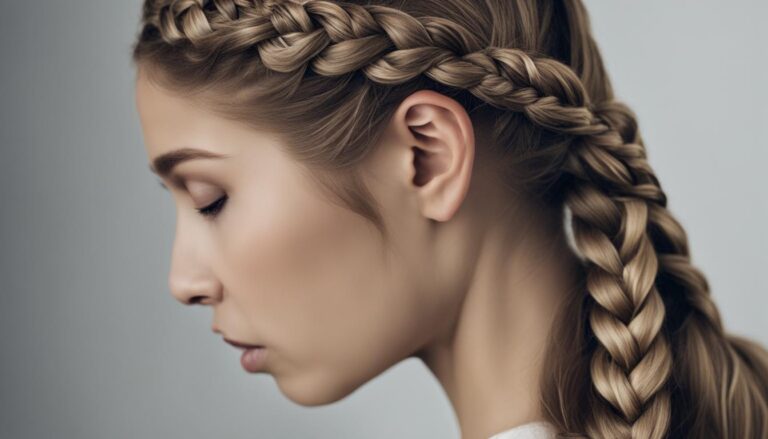Is It Bad to Tie Your Hair Up When You Sleep?
Sleep is a crucial time for our bodies to repair and rejuvenate, but what about our hair? Many of us have wondered whether tying our hair up when we sleep is beneficial or harmful. The answer actually depends on the length and type of your hair. Let’s uncover the truth about hair care while sleeping and explore the best sleep hairstyles.
Key Takeaways:
- Tying your hair up when you sleep can have advantages or disadvantages based on your hair type.
- For short hair, allowing it to flow freely while sleeping promotes better air circulation.
- Long hair can benefit from a loose tie to prevent tangles and breakage.
- Avoid tying hair too tightly to prevent damage to the hair roots and traction alopecia.
- Brushing your hair before bed and avoiding sleeping with wet hair are crucial for hair care while sleeping.
How to Protect Your Hair While Sleeping
Proper hair care while sleeping is crucial for maintaining the health and appearance of your hair. Here are some essential tips to help you protect your hair while you sleep:
1. Brush Your Hair Before Bed
Brushing your hair before going to bed is a simple yet effective way to detangle your locks and distribute the natural oils produced by your scalp. This helps to keep your hair moisturized and reduces the risk of breakage. Use a wide-toothed comb or a boar bristle brush made of neem wood for gentle detangling. Remember to be careful and avoid brushing your hair when it’s wet, as wet hair is more susceptible to damage.
2. Avoid Sleeping with Wet Hair
Wet hair is more fragile and prone to breakage, so it’s best to avoid sleeping with wet or damp hair. If you’ve washed your hair before bed, make sure it is fully dry before you lay down. This will help prevent hair fall and minimize the risk of fungal infections. Additionally, sleeping on damp hair can lead to unruliness and increased styling time in the morning, which can further damage your hair.
3. Apply Overnight Hair Serum
Using an overnight hair serum can provide nourishment and protection to your hair while you sleep. Look for natural or Ayurvedic serums that are free from silicone, as silicone-based products can cause product buildup over time. Applying a serum before bed allows the ingredients to deeply penetrate your hair follicles, boosting hair growth and preventing frizz. Consider using aloe vera gel as a natural serum for your scalp and hair.
By incorporating these hair care routines into your nighttime routine, you can ensure that your hair remains healthy, strong, and beautiful.
How to Tie Your Hair While Sleeping
Tying your hair while sleeping can help prevent tangles and breakage, but it’s important to choose the right hairstyles and techniques to minimize damage. Here are some tips on how to tie your hair while sleeping:
1. Opt for loose styles
When tying your hair, choose loose styles that don’t pull or strain your hair. Avoid tight ponytails or buns that can lead to hair breakage and traction alopecia. Instead, go for loose braids or loose ponytails to keep your hair secure without causing damage.
2. Use soft fabric accessories
Avoid using metal or rough hairbands when tying your hair. Instead, opt for soft fabric scrunchies or hair ties made of gentle materials. This will minimize friction and reduce the risk of hair breakage while you sleep.
3. Consider the benefits of loose hair
Sleeping with your hair loose can have certain benefits, especially if you have long hair. Loose hair allows for natural movement and reduces the risk of tangles and knots. Additionally, keeping your hair down while sleeping can promote better airflow, which is beneficial for overall hair health.
Remember, it’s important to find a balance between keeping your hair secure and protecting it from damage while you sleep. By choosing loose styles and using gentle accessories, you can tie your hair in a way that reduces breakage and promotes healthy hair growth.
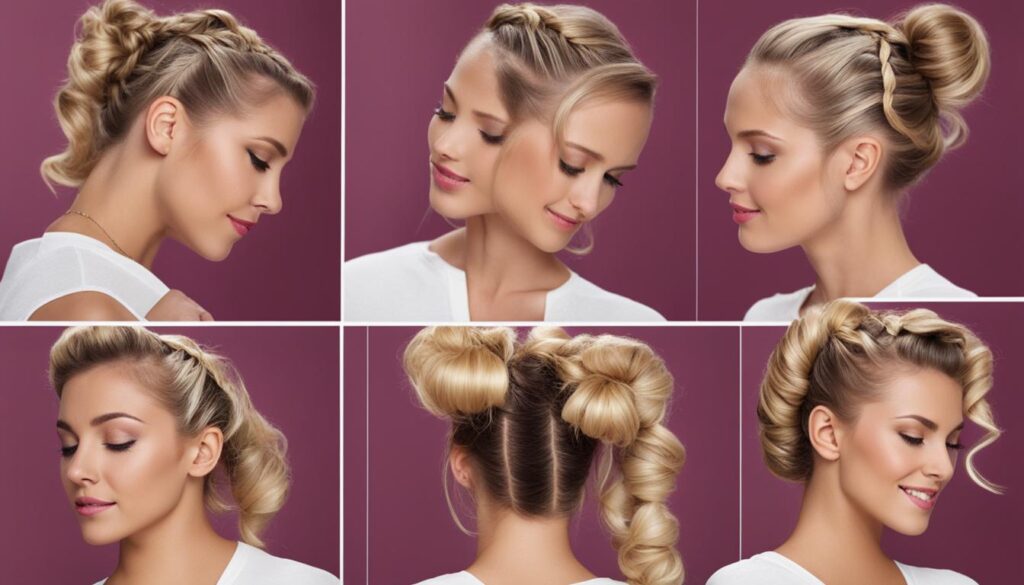
What Happens If You Don’t Protect Your Hair at Night?
Not protecting your hair at night can have negative consequences and result in various issues such as hair loss, tangles, split ends, frizz, and breakage. It’s important to take proactive measures to care for your hair while you sleep to minimize damage and maintain its overall health.
One of the main problems with not protecting your hair at night is the risk of hair loss. Leaving your hair unprotected can lead to tangling and friction, which can weaken the hair follicles and result in excessive shedding. Additionally, tight hairstyles or using harsh materials like metal bands can cause physical damage and traction alopecia, a condition where constant pulling leads to hair loss.
Another issue that can arise from not protecting your hair at night is increased breakage. When you toss and turn during sleep, your hair can rub against the pillow or get caught on rough surfaces, causing it to become brittle and prone to breakage. By safeguarding your hair with gentle styles and using soft fabric accessories, you can minimize this risk.
Furthermore, failure to protect your hair at night can contribute to frizz and split ends. The natural oils produced by your scalp help keep your hair moisturized and smooth, but sleeping without any protection can cause these oils to be absorbed by your pillowcase, leaving your hair dry and prone to frizz. Split ends can also occur if your hair rubs against a rough surface, resulting in damaged and frayed ends.
By implementing hair protection strategies before bed, such as loosely tying your hair up, using soft accessories, and choosing gentle hairstyles, you can minimize the potential damage and maintain healthy, beautiful hair.
Brush Your Hair Before Going to Bed
One important step in caring for your hair before sleep is to brush it. Brushing your hair before going to bed not only helps to detangle it but also has several other benefits. By brushing your hair, you can distribute the natural oils produced by your scalp evenly throughout your hair strands, which helps to keep your hair moisturized and nourished.
When brushing your hair before bed, it is recommended to use a wide-toothed comb or a boar bristle brush made of neem wood. These types of brushes are gentle on the hair and minimize friction, reducing the risk of breakage. Additionally, brushing your hair before sleep can help to stimulate blood circulation in the scalp, promoting healthier hair growth.
Brushing your hair before going to bed helps to detangle the hair and distribute the natural oils from the scalp evenly.
It is important to note that brushing your hair should be done gently and not when the hair is wet, as wet hair is more fragile and prone to damage. Take your time and start brushing from the ends, working your way up to the roots, to prevent unnecessary stress on the hair. By incorporating regular hair brushing into your nighttime routine, you can contribute to maintaining healthy and manageable hair.
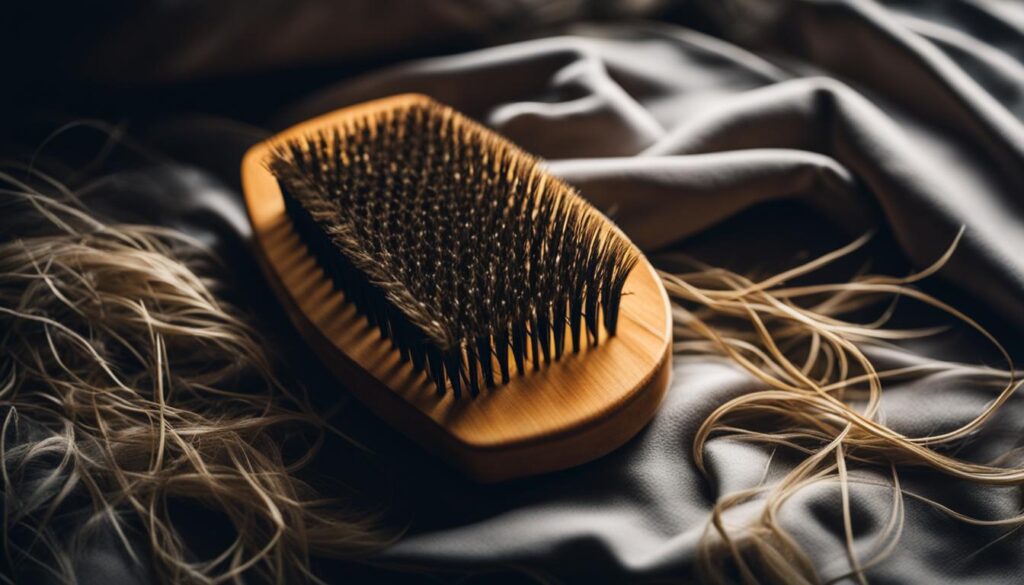
Benefits of Brushing Your Hair Before Bed:
- Detangles the hair and reduces knots
- Distributes natural scalp oils evenly
- Stimulates blood circulation in the scalp
- Promotes healthy hair growth
- Minimizes breakage and damage
Never Sleep With Wet Hair
Sleeping with wet hair can have detrimental effects on your hair health. Wet hair is more fragile and prone to breakage, especially when it rubs against pillows during sleep. This can lead to hair fall and damage to the hair shaft. Additionally, keeping your hair wet for prolonged periods can create a damp environment that promotes the growth of fungi, resulting in scalp infections.
It is important to avoid washing your hair right before bed and ensure that it is fully dried before you sleep. This can be done by allowing your hair to air dry naturally or using a blow dryer on a low heat setting. Taking the time to properly dry your hair will minimize the risk of hair fall and fungal infections, and leave your hair looking healthier in the morning.
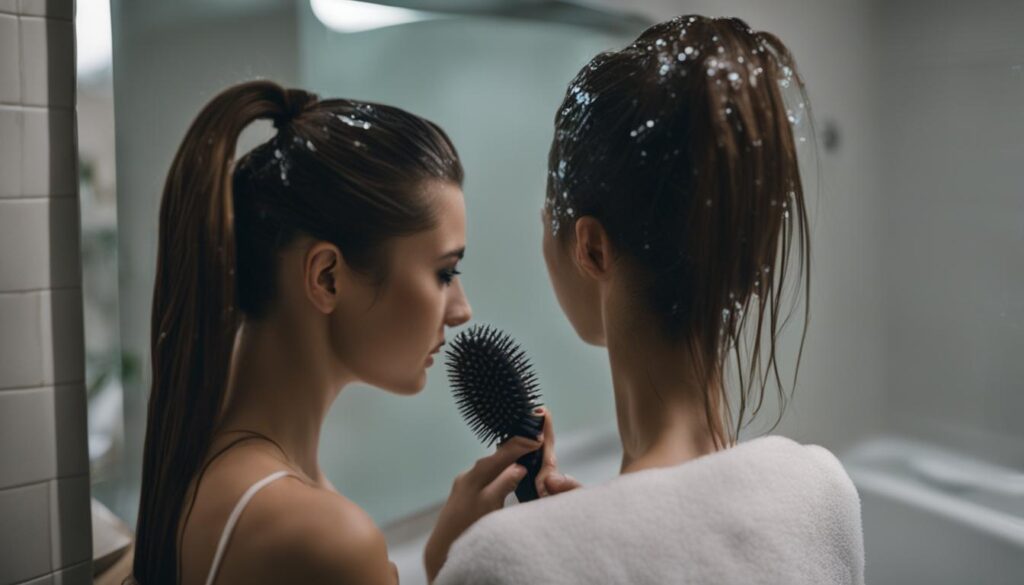
H3: Tips for drying your hair after a shower:
- Use a microfiber towel or an old t-shirt to gently squeeze out excess water from your hair instead of rubbing vigorously with a regular towel. This helps to minimize breakage and frizz.
- Avoid blow drying your hair on high heat, as this can cause damage. Instead, use a cool or medium heat setting and keep the blow dryer moving to prevent overheating specific areas.
- Consider applying a heat protectant spray or serum to your damp hair before blow drying to minimize heat damage.
- If you have the time, let your hair air dry naturally. This is the gentlest drying method and can help prevent heat damage.
Avoiding sleeping with wet hair is a simple but effective step in your hair care routine that can have a big impact on the health and appearance of your hair. By taking the time to properly dry your hair before sleep, you can minimize the risk of hair fall, fungal infections, and damage, leaving you with beautiful, more manageable hair.
Apply Overnight Hair Serum
Applying an overnight hair serum is a beneficial step in your hair care routine, providing numerous advantages for your hair’s health and appearance. Overnight hair serums have the potential to stimulate hair growth and enhance the overall condition of your hair.
One of the key benefits of using an overnight hair serum is its ability to activate the hair growth hormone. These serums contain ingredients that nourish the hair follicles and increase blood circulation in the scalp. By applying the serum before sleep, you allow the active ingredients to work on your hair for an extended period, promoting natural hair growth.
When choosing an overnight hair serum, opt for natural formulations that are free from silicones. Natural hair serums are gentle on the scalp and hair, reducing the risk of product buildup and potential irritation. Additionally, these serums often contain ingredients like aloe vera and botanical extracts, which provide essential nutrients and hydration to your hair while you sleep.

Incorporating an overnight hair serum into your nighttime routine is a simple and effective way to enhance your hair care regimen. By nourishing your hair while you sleep, you can wake up to healthier, shinier, and more manageable locks. Remember to apply the serum to your scalp and lengths, focusing on the areas requiring extra care. With consistent use, an overnight hair serum can help transform your hair, leaving it looking and feeling its best.
Conclusion
In conclusion, taking care of your hair while sleeping is crucial for maintaining healthy and beautiful locks. By following a few simple tips, you can prevent damage, tangles, and frizz, and promote the overall well-being of your hair.
Tying your hair loosely before sleep allows for free air flow and reduces the risk of hair breakage. Brushing your hair before bed helps distribute the natural oils from your scalp, keeping your hair nourished and detangled. It is also important to avoid sleeping with wet hair, as this can lead to hair fall and fungal infections.
Applying overnight hair treatments, such as natural serums or warm oil treatments, can nourish and strengthen your hair while you sleep. Choosing the right hairstyles and using soft fabric accessories can minimize physical damage and promote healthy hair growth.
By establishing a regular hair care routine before sleep, you can ensure that your hair remains healthy and vibrant. So, prioritize hair care while sleeping and enjoy the benefits of luscious and beautiful hair every day!
FAQ
Is it bad to tie your hair up when you sleep?
Tying your hair up when you sleep can have both advantages and disadvantages depending on your hair type. For short hair, it is best to sleep with your hair down to allow for free air flow. However, for long hair, loosely tying it up can help prevent tangles and breakage. It is important to avoid tying your hair too tightly, as this can damage the hair roots and cause traction alopecia.
How can I protect my hair while sleeping?
There are several ways to protect your hair while sleeping. Firstly, brushing your hair before bed helps to distribute the scalp’s natural oils and detangle your hair. It is also important to avoid sleeping with wet hair, as this can lead to hair fall and fungal infections. Applying overnight hair serums and moisturizing your hair with a warm oil treatment can help nourish and strengthen your hair while you sleep. Additionally, massaging your scalp before sleep can stimulate blood circulation and promote healthy hair growth.
How should I tie my hair while sleeping?
When tying your hair while sleeping, it is important to opt for loose styles that minimize pulling and friction. For long hair, a loose ponytail or braid is recommended to prevent knots and breakage. Tying a high bun in the crown region can add volume to thin and flat hair without interfering with sleep. For those with straight hair, sleeping with braided hair can result in natural curls in the morning while keeping the hair tangle-free. It is essential to use soft fabric scrunchies or rubber bands and avoid tying hair with bands made of metal or rough materials.
What happens if I don’t protect my hair at night?
Not protecting your hair at night can lead to various issues such as hair loss, tangles, split ends, frizz, and breakage. Tight hairstyles or leaving the hair unprotected can cause physical damage and traction alopecia. The environment, including room humidity and temperature, can also affect the health of your hair while you sleep. It is important to take steps to protect and care for your hair during sleep to maintain its health and minimize damage.
Should I brush my hair before going to bed?
Brushing your hair before going to bed helps to detangle the hair and distribute the natural oils from the scalp evenly. It is recommended to use a wide-toothed comb or a boar bristle brush made of neem wood. This should be done gently and not when the hair is wet to avoid damage. Regularly brushing your hair before sleep can contribute to maintaining healthy and manageable hair.
Is it okay to sleep with wet hair?
Sleeping with wet hair can increase the risk of hair fall and fungal infections. Wet hair is more fragile and prone to breakage, especially when it rubs against pillows. It is better to avoid washing your hair at night and ensure that it is fully dried before going to bed. Damp hair can also become unruly in the morning, leading to increased styling time or even the need for re-washing, which can further damage the hair.
How can I apply overnight hair serum?
Applying a natural or Ayurvedic hair serum to your scalp and hair before sleep can rejuvenate hair follicles, boost hair growth, and prevent frizz. Overnight application of hair serums allows the ingredients to deeply penetrate into the hair follicles, providing nourishment and protection. Silicone-free serums made of natural ingredients are recommended, as silicone-based serums may cause product buildup over time. Aloe vera gel can be used as a natural serum on the scalp and hair before sleep.
What is the conclusion of hair care while sleeping?
Proper hair care while sleeping is essential for maintaining healthy hair. Tying your hair loosely, brushing before bed, avoiding sleeping with wet hair, and applying overnight hair treatments can help protect your hair from damage, tangles, and frizz. Choosing the right hairstyles and using soft fabric accessories can minimize physical damage and promote healthy hair growth. It is important to establish a regular hair care routine before sleep to ensure the overall health and well-being of your hair.

